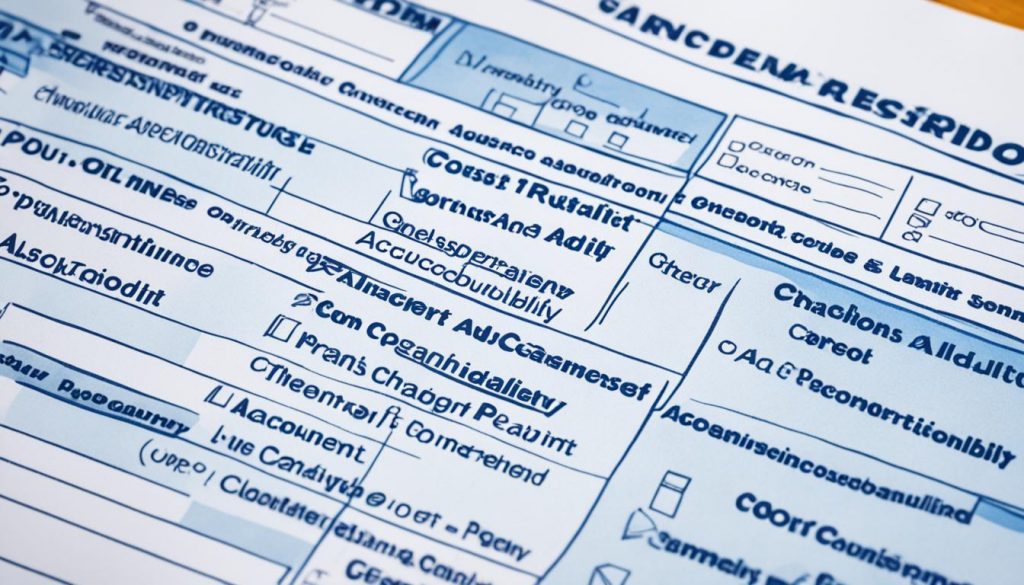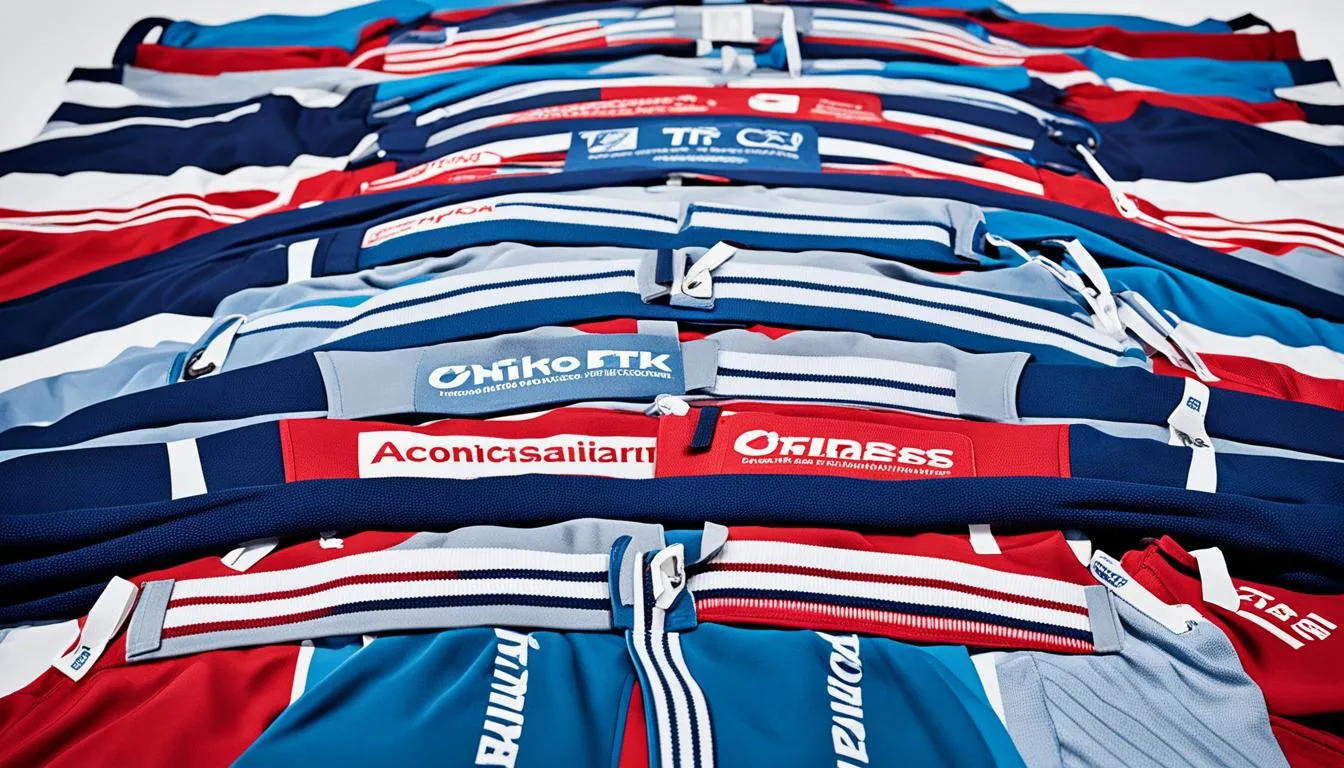The Benefits of Supplier Audits in Maintaining Transparency
Connect With Us Today
Consider us for your next production run. Why wait? Send us your questions here.
Supplier Audits are key as we deal with complex supply chains today. They help brands maintain transparency, which is crucial. A big 65% of shoppers care about a brand’s supply chain integrity. This impacts their loyalty and buying choices. We use this insight to make our operations clearer.
Companies like Proctor & Gamble work with nearly 50,000 suppliers. It’s their job to ensure ethical sourcing and production. Laws in the UK, California, and the EU require strict checks against human slavery and environmental harm. Meeting these laws, we strengthen consumer trust and build our brand.
Audits are essential in today’s economic climate. We aim to exceed industry standards. Through audits, we show our commitment to accountability. We believe our brand’s value is in the ethical transparency we maintain in our supply chain.
Key Takeaways
- Transparency greatly influences the buying decisions of most consumers.
- Transparent practices are crucial for earning customer trust and keeping a strong brand image.
- Detailed supplier audits are vital for large brands to meet ethical standards and avoid legal issues.
- Audit processes are significant in determining a brand’s worth, highlighting the need for effective auditing strategies.
- New regulations on supply chains call for innovative, dedicated approaches to transparency and ethics.
Exploring the Critical Role of Supply Chain Audits
The global marketplace has complex supply chains. Yet, they are key to keeping our promise of high quality to customers. Our focus on Supplier Compliance Audits is more than just routine. It’s essential for our brand’s integrity and ethical commitment. Many of our manufacturing partners have worked with us for a long time. This shows how important thorough and regular supply chain audits are for strong, rule-following relationships.
We have Supplier Risk Management strategies to meet the newest industry standards. About 65% of our independent manufacturing partners have been with adidas for at least ten years. This shows our dedication to reliable supply chain relationships. Additionally, 35% have been with us for over 20 years. This highlights a trust built on strict compliance and shared values.
Ensuring Compliance with Industry Standards
Compliance with industry standards is an ongoing process, not just a single check. Our network includes over 400 independent factories in roughly 45 countries. Each one knows overlooking is not allowed. They are parts of our wide supply network, audited and motivated to meet specific performance standards. That’s because high volume production doesn’t lessen the need for individual responsibility.
Identifying Risks and Providing Evidence of Compliance
Our Supply Chain Audit Strategy is designed to spot risks early. Every sourcing location of adidas gets regular thorough reviews. This ensures that we stay compliant and ready to act fast if problems pop up. We reward our suppliers for their continuous commitment to our standards by placing more orders with them.
Steps to Develop an Effective Supply Chain Audit Strategy
Building a strong audit strategy requires careful planning. At adidas, our strategy involves a layered review of supply – from main manufacturing partners to raw material suppliers. We stand firm in our goals, working with about 110 manufacturing partners worldwide. Our detailed approach to performance metrics influences the length and depth of our partnerships. We ensure that every product shows our commitment to quality and ethical production.
The Benefits of Supplier Audits in Maintaining Transparency
In today’s global business, we aim for excellence by enhancing transparency in our supply chains. Following rules like the Dodd-Frank Act adds strictness to our work and boosts our ethical reputation.
Improving Supplier Performance Transparency
Regular supplier audits help make supplier activities clearer. They remove doubts and show us a full picture. Laws, such as France’s carbon emissions reporting, stress the need for clear information, especially about the environment.
Validating Data Accuracy and Ethical Standards
The Rana Plaza tragedy showed the importance of checking our suppliers carefully. Regular Supplier Auditing ensures our data is reliable and our suppliers meet high ethical standards. Studies prove that good auditing reduces negative impacts from suppliers.
Maximizing Business Success Through Regular Auditing
Audits give valuable insights. They help find ways to save money, like improving energy use and managing waste better. Investors see good auditing as a sign of profitable and responsible management.
| Legislation | Impact on Transparency | Cost to Companies | Outcome |
|---|---|---|---|
| Dodd-Frank Act | Required conflict mineral disclosure | Up to $4 billion for supply chain audits | Increased investment in ethical supply chains |
| France’s Carbon Emissions Reporting | Mandated transparency in carbon footprint | Varied based on compliance changes | Promoted greener supply chain practices |
| Post-Rana Plaza Coalition | Held suppliers accountable for safety standards | Investment in safety and compliance audits | Enhanced supplier performance transparency |
We commit to corporate responsibility with pride and foresight. Our structured audits and compliance show our dedication to leadership.
Comprehensive Supplier Audit Types and Their Impact
In today’s complex business world, it’s crucial to be diligent and accountable. This requires different kinds of supplier audits. Financial Audits check our partners’ fiscal details, making sure they meet regulatory standards. Operational Audits look at how efficient and effective business operations are. They make sure everything works smoothly.
Environmental Audits highlight the importance of green business practices. They show we care about the planet. Ethical Sourcing Audits prove we’re committed to fairness and humanity in our supply chain. It’s about doing the right thing.
We strive for a supply chain that’s both sustainable and transparent. We follow the Responsible Business Alliance’s (RBA) code of conduct. This aligns us with companies like Apple that care about labor, human rights, and the environment.
Sharing audits with RBA members and suppliers strengthens our integrity. It also brings cost savings and boosts efficiency.

Adopting common audit standards speeds up transparency in the supply chain. It makes focusing on important data easier and simplifies reporting.
New rules, like the EU Public Procurement Directives, push us to source responsibly. They lay the foundation for our commitment to meet global standards. This builds a culture of responsibility that reaches far beyond our operations.
We learn from top industry players to create a wide range of audit frameworks. This gives us a complete view of our operations. Our strong audit practices go beyond stakeholder expectations. They build trust, spark innovation, and strengthen our place in the market.
We’re always looking to improve how we operate. We use new tech like real-time systems and blockchain. This isn’t just about meeting rules. It’s about making our supply chain clearer and more trusted by everyone involved.
| Audit Type | Regulatory Alignment | Primary Focus |
|---|---|---|
| Financial Audits | Compliance with financial reporting standards | Fiscal integrity and accuracy of financial data |
| Operational Audits | Efficiency within operational practices | Process optimization and performance enhancement |
| Environmental Audits | Adherence to environmental protection regulations | Sustainable practices and reduction of ecological footprint |
| Ethical Sourcing Audits | Compliance with human rights and ethical sourcing guidelines | Fair labor practices and responsible supply chain management |
Understanding Regulatory Compliance in Supplier Evaluations
In global commerce, Compliance with Regulations is crucial. It builds trust and boosts efficiency in supply chains. In fields like pharmaceuticals and medical devices, ensuring supplier compliance is critical. It’s not just a legal formality. It’s about protecting our reputation and the safety of what we offer to our customers.
We take supplier evaluations seriously, aiming to avoid risks. We align with authorities like the FDA and EMA. Our assessments cover everything from labor rights to environmental standards. These thorough checks can take weeks to complete.
The health of our supply chain depends on regular, detailed audits. We learn from any issues and strengthen our systems as a result. For us, transparency is key in how we operate and make improvements.
Technologies like blockchain are changing how we manage compliance. They show our commitment to being better and holding every part of our supply chain accountable. Here are the steps we’ve taken to stay on top of regulations:
- Implementing rigorous qualification processes for new suppliers
- Executing regular supplier audits, including unannounced assessments
- Ensuring up-to-date training and development for our suppliers
- Utilizing advanced technologies for real-time supply chain oversight
- Aligning with the highest global standards such as GMP, GLP, and GDP
We’re proactive in keeping up with regulatory changes. This keeps us ahead and ensures our products are safe and high-quality. Our dedication to compliance and ethical practices helps us avoid legal issues. It’s key to our mission of delivering excellence.
Our strict supplier evaluation also supports labor and human rights standards. This holistic approach shows our belief that ethical practices help businesses thrive. We’re always working to improve our standards.
How we handle Supplier Qualification Audits expresses our company values. Managing our supply chain ethically and efficiently is our top priority. It takes careful planning and dedication to maintain our reputation for quality.
Crafting an Audit Plan for Optimal Supplier Transparency
Creating a Supplier Audit Plan requires strategic thinking and precise action. It involves balancing the audit budget with supplier operations. Our goal is to improve processes without interrupting work. We do this by ensuring audits are thorough and cost-effective. This helps keep things transparent and efficient.
Strategic audit planning blends regular internal checks with participation in groups like SCAN. This mix reduces supplier audit fatigue and promotes shared compliance. It also supports trusted audit verifications, including the use of blockchain.
Identifying Audit Activities and Assessing Impact on Operations
We focus on making audits efficient by using manufacturing audit software. This software helps automate and standardize tasks. It saves time and money, and gives us immediate data for better supply chain management. We also pick audit activities that support environmental responsibility. This reflects Patagonia’s approach to examining their supply chain for sustainability.
Setting Clear Goals and Budget for the Audit Process
Effective Audit Budgeting starts with setting clear goals early. We precisely plan the resources we’ll need, like staff, technology, and time. Inspired by SCAN and BSI’s partnership, we aim to cut costs. We do this by adopting a unified audit method and safely sharing results.
Establishing Effective Communication Channels During Audits
Good Audit Communication is crucial for successful audits. We ensure clear, automated ways to share audit results, similar to SCAN’s methods. This encourages teamwork for corrective steps. We use software that keeps detailed track reports. This means everyone knows what’s happening during the audit process.
Our goal at the end of audits is high transparency and compliance excellence. We want a supply chain built on integrity, with a strong commitment to sustainable and ethical practices.
Executing Supplier Audits with Precision and Integrity
As we align with transparency, choosing the right auditing firm is crucial. Our selection process checks a firm’s track record for integrity and excellence in audits, making sure they can navigate our supply chains well.
Selecting and Verifying the Credentials of Auditors
We dig deep when picking an auditing firm. It’s not just about their name. We evaluate their skill in conducting thorough supplier audits. The auditors must grasp supply chain details and industry rules well.
Conducting Onsite Inspections and Supplier Interviews
Once we select auditors, they examine our supply chain up close. They conduct onsite checks and talk to our suppliers. This ensures we get real insights from those who know our operations best.
Reviewing Findings and Developing Corrective Actions
After getting audit reports, we carefully go through each point. We aim to match our practices with ethical standards, like those in the UN Universal Declaration of Human Rights. Our goal is to always improve what we do.
In light of the importance of transparency, our audits are about excellence and truth. This ensures we meet the high expectations of our stakeholders.
Data Analysis and Strategic Improvements Post-Audit
With Supply Chain Data Analytics, we can use Performance Metrics for better Process Improvements. Audit data shows us where we can get better. This guides us to smart changes.
Our audits show gaps in standard practices. A recent study shows Performance Metrics are not always fully reported. This shows a big need for better checks on issues like workers’ rights.
The social audits industry makes around US$300 million a year. But, this big spending doesn’t always lead to clear or responsible Performance Metrics.
For example, audits we review show some issues. When auditors are paid directly by suppliers, they might not be strict enough. This could make audit results not always true. We’re working to fix this with better and fairer analytics methods.
| Audit Payment Source | Average Detected Violations | Audit Cost Range |
|---|---|---|
| Supplier-Paid Audits | Fewer Violations Reported | $645 – $3,700 |
| Client or Buyer-Paid Audits | Higher Violation Reporting | N/A |
We are making our Process Improvements stronger. We’re looking at ways to show when rules are not followed. Things like secret accounting or training workers to hide facts. We’re working hard to make audits more trusted and lift our industry’s reputation.
- Implementing unannounced audits to counteract prepared deceptions.
- Employing data analysts specializing in Supply Chain Data Analytics to cross-verify audit reports and underlying datasets.
- Advocating for the transparent publication of audit findings to foster trust and accountability.
Our goal is to improve audit methods with a data-focused view. We’re dedicated to honest practices and being open in our operations. As we work towards excellence in the supply chain, our commitment is stronger than ever.
Embracing Technological Solutions like Sedex
We’re moving through a changing world of global supply chains. And we see how platforms like Sedex make a big impact. Sedex helps companies focus on ethical trade in their networks. With the Sedex Members Ethical Trade Audit (SMETA), we join a move towards serious, uniform audits. This shows our commitment to doing business right.
Investors and consumers are demanding more responsibility, especially in ESG practices. SMETA Auditing is our way to prove we’re part of an Ethical Business Community.
Evaluating Supply Chain Integrity with SMETA Audits
SMETA Auditing looks closely at how a company follows labor standards, safety, environmental actions, and ethics. It checks everything important, spotlighting labor rights and green tech. This shows our promise to be sustainable and fair.
Joining a Community for Ethical and Responsible Business
Being part of Sedex is more than just following rules. It shows we’re serious about improving trade ethics with others. By doing Sedex audits, we strengthen our duty and image. This pulls in partners who value these ethics too.
| Element | Details | Impact on Supply Chain Ethics |
|---|---|---|
| Labor Standards | Covers fair wages, working hours, and a safe work environment. | Ensures equitable treatment and conditions for all laborers. |
| Health and Safety | Involves proactive strategies to protect employees from hazards. | Reduces accidents and occupational health issues. |
| Environmental Performance | Assesses efforts in reducing greenhouse gas emissions and responsible sourcing. | Aligns operations with sustainable practices and the Paris Agreement. |
| Business Ethics | Encompasses expectations of lawful compliance and anti-corruption policies. | Creates a trust-based system for integrity and business conduct. |
Unilever’s use of their Responsible Partner Policy shows how ESG strategies through Sedex benefit us and our partners. We encourage a culture of ongoing review and challenge-solving. This improves standards and consistency across global supply chains.
Incorporating Supplier Audits to Boost Brand Loyalty and Customer Trust
We are deeply committed to enhancing Brand Loyalty and Customer Trust through Ethical Production Transparency. To achieve this, we’ve integrated thorough supplier audits into our operations. These audits show our dedication to social responsibility and build consumer confidence.
Last year, we completed over 800 supplier assessments, aligning with the Apple Supplier Code of Conduct. We made 214 surprise visits. This shows our commitment to authentic and responsible partnerships, enhancing Customer Trust.
We talked directly with over 539,000 people in our supply chain about their workplace experiences. This effort led to over 5,400 improvements based on their feedback.
In the face of global challenges, as noted in the 2022 “Interos Annual Global Supply Chain Report,” we stay focused on Ethical Production Transparency. This commitment has led to the removal of suppliers not meeting our ethical standards—25 manufacturers and 205 material processors since 2009. Last year alone, we took 8,300 corrective actions.
With the creation of the Apple Education Hub and our Supplier Employee Development Fund programs, over 1.2 million people have benefited. This enhances Brand Loyalty by providing valuable knowledge and skills to our supply chain workforce.

Informed customers are key to a sustainable brand. Our audits offer critical insights, building a sturdy trust. This helps create a loyal customer base that values our integrity and vision.
| Fiscal Year 2022 Initiatives | Impact |
|---|---|
| Supplier assessments completed | Over 800 aligned with Apple’s Code of Conduct |
| Surprise supplier audits | 214 visits signifying spontaneous compliance checks |
| Direct supplier engagement | Over 539,000 individuals dialogued on workplace experiences |
| Corrective actions taken | 8,300 adjustments adhering to ethical audits |
| Workplace improvements | More than 5,400 enhancements from employee feedback |
| Educational advances | Introduction of Apple Education Hub; over 1.2 million participants in development programs |
Our journey to deepen Brand Loyalty and Customer Trust is guided by Ethical Production Transparency. It is a strategy and a moral commitment. We aim to build a legacy of transparency that wins consumer trust and protects their interests.
Championing Ethical Sourcing with Transparent Supply Chain Practices
Today, ethical sourcing is essential and sets us apart. It shows we’re serious about trust with customers and partners. By focusing on ethical practices throughout our supply chain, we’ve made a real difference. For example, in 2022, we managed to source 81% of our key agricultural materials sustainably. Plus, all our soybean oil came from verified sustainable sources.
We keep our product journey transparent, from the seed to the shelf. Through detailed supply chain disclosures, we show our commitment. In fact, 97% of our paper and board packaging comes from recycled materials or sustainable forests. This sets a high standard for environmental care.
Building Trust through Fact-Based Supply Chain Disclosures
Our soy oil mainly comes from US and Brazil. We’re working to make our Latin American supply chain deforestation-free by 2023. It’s not just a goal; it’s a reflection of our dedication to the planet. Our efforts in Brazil have helped over 40 farmers gain RTRS certifications. This enhances both sustainability and corporate social responsibility transparency.
Differentiating Through Transparent Corporate Social Responsibility
Our Climate & Nature Fund backs regenerative agriculture. We’re aiming for 80% regenerative sourcing for Knorr’s main ingredients within five years. This shows how much we care about our environmental and community impact. Our approach to building responsible supply chains makes us a leader in our field. It’s not just about product quality but also living up to our moral values.
For us, being transparent is fundamental. We know today’s consumers want clarity, and we aim to provide just that. By giving a clear insight into our operations, we build trust and loyalty. Ethical sourcing and thorough supply chain disclosures are central to our mission. They’re proof of our commitment to making sustainability a norm in all our activities.
Conclusion
Reflecting on the journey toward maintaining supply chain integrity, we see supplier audits are not just compliance. They are the foundation of ethical business. We find that doing audits regularly, about every two years, is vital. They show we’re serious about transparency and accountability. The move toward unannounced audits lets us see real operations. This helps us keep our supply chain truthful.
We commit to three types of audits: announced, unannounced, and desktop. Each plays a key role in our strong ethical business strategy. By examining operations, finances, and product quality, and hearing what customers say, we spot and fix risks. This improves customer happiness. These audits also help us build trust with our partners, making our business circle stronger.
Every audit report offers a chance to grow. It details a factory’s profile, findings, and gives us a chance to reflect. These reports highlight areas for improvement and show we stand for transparency and accountability. Through these thorough reviews and actions, we stick to our integrity pledge. Our goal is to lead the industry. We aim for a business culture that is as hardworking as it is ethical.
FAQ
What are the key benefits of conducting supplier audits?
How do supplier audits help in ensuring compliance with industry standards?
What steps are involved in developing an effective supply chain audit strategy?
What types of supplier audits are there and how do they impact business?
How does regulatory compliance factor into supplier evaluations?
What are the essential components of an audit plan for optimal supplier transparency?
How are supplier audits executed with precision and integrity?
What is the role of data analysis after a supplier audit?
How do technological solutions like Sedex aid in supplier audits?
Why are supplier audits important for building brand loyalty and customer trust?
How do transparent supply chain practices enhance ethical sourcing?
Source Links
- https://www.oracle.com/scm/supply-chain-transparency/
- https://www.gsb.stanford.edu/insights/costs-benefits-supply-chain-transparency
- https://www.sciencedirect.com/science/article/abs/pii/S0377221720301429
- https://www.adidas-group.com/en/sustainability/social-impacts/supply-chain
- https://www.responsiblebusiness.org/media/docs/RBAPracticalGuideProcurement.pdf
- https://www.apple.com/supplier-responsibility/pdf/How-We-Work-With-Suppliers.pdf
- https://fastercapital.com/content/Supply-Chain-Management–Ensuring-Transparency-through-Auditability.html
- https://www.justice.gov/criminal/criminal-fraud/page/file/937501/dl
- https://www.linkedin.com/pulse/ensuring-supplier-compliance-pharma-medical-device
- https://www.bsigroup.com/en-GB/insights-and-media/insights/case-studies/delivering-transparency-and-consistency-for-global-supply-chains/
- https://www.compliancequest.com/audit-management/internal-audit-procedure-for-manufacturing-company/
- https://www.patagonia.com/our-footprint/working-with-factories.html
- https://www.hrw.org/report/2022/11/15/obsessed-audit-tools-missing-goal/why-social-audits-cant-fix-labor-rights-abuses
- https://www.mcdonalds.com/content/dam/sites/corp/nfl/pdf/Supplier_Code_of_Conduct.pdf
- https://www.sedex.com/blog/esgs-impact-on-supply-chains-what-to-expect-in-2024/
- https://www.theodmgroup.com/what-is-a-sedex-audit/
- https://www.unilever.com/planet-and-society/respect-human-rights/human-rights-in-our-value-chain/
- https://www.apple.com/supplier-responsibility/
- https://www.netsuite.com/portal/resource/articles/erp/supply-chain-bottlenecks.shtml
- https://www.unilever.com/planet-and-society/protect-and-regenerate-nature/sustainable-and-regenerative-sourcing/
- https://www.hqts.com/what-is-a-supplier-audit/
Latest News
How Collaboration Shapes Consumer Preferences in Sportswear
Navigating Consumer Rights and Warranties in Sportswear Sales
Artificial Intelligence in Fashion Forecasting and Trend Analysis
The Shift Towards Inclusive Sizing in Sportswear: Consumer Reactions
The Global Expansion of Luxury Sportswear Brands
From Sketch to Gym: The Design Process of Fashionable Sportswear
Understanding the Role of Trade Associations in Sportswear Compliance
How Economic Trends Influence Consumer Spending on Sportswear
Learning from Successful Global Market Entries
Best Practices for Managing Cross-Cultural Teams
Using Technology to Fight Counterfeit Fashion Products
Carbon Nanotube Fabrics for Superior Strength and Flexibility
The Growth of Fitness Tracking Apparel in Health and Wellness
Exploring the Influence of Social Proof in Sportswear Purchasing
Strategies for Managing Compliance in a Multinational Operation
Trends in Global Footwear: Performance Meets Lifestyle
The Role of Artificial Intelligence in Tracking Supply Chain Operations
Evaluating the Success of Sportswear Collaborative Projects
Evaluating the Potential of Emerging Markets
Global Shifts Towards Gender-Neutral Sportswear
Share This Article
Latest Articles



















